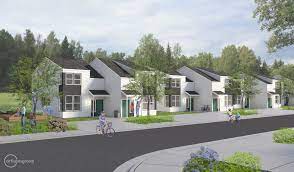In the Washington neighborhood of Long Beach, the construction of Habitat housing at Locust Avenue has begun.
The development is the largest by Habitat for Humanity of Greater Los Angeles. It features 36 two- and three-bedroom condominium apartments. The apartments will be spread across four distinct buildings.
Two of the apartments will be set aside for people with extremely low incomes. 20 of the remaining units will be set aside for those with low incomes, and the other 14 for people who can afford to pay market rates.
A household of two earning $47,650 or less is deemed to have a very low income. Additionally, a household of two earning more than that but less than $76,250 is deemed to have a low income. This is according to the Department of Housing and Urban Development and the California Department of Housing and Community Development.
Features of the Habitat housing at Locust Avenue
The Habitat housing at Locust Avenue has ground-level garages and a total of 68 total parking places.
Also Read: Trammell Crow begins construction of multifamily project, Los Angeles
Moreover, the new home development will contain eco-friendly elements that can withstand droughts in order to provide sustainable housing. These elements include solar panels, low-flow plumbing fixtures, insulation made of recycled blue jeans, and yards.
In recent years, Habitat LA has concentrated its neighborhood revitalization initiatives on the Washington neighborhood, where the organization celebrated surpassing 1,000 homes built in November. These initiatives were created to address both a lack of affordable housing and disinvestment in neighborhood infrastructure.
“The location is significant to us for a variety of reasons. First off, Habitat LA constructed its first home here in Long Beach 32 years ago. Habitat LA’s objective is to significantly raise the standard of living for locals while also continuing to build houses.
This is because as the organization’s CEO Erin Rank noted, “housing is such a critical need, especially entry-level affordable housing, and to help this community grow into the greater community that we know it can be.”
